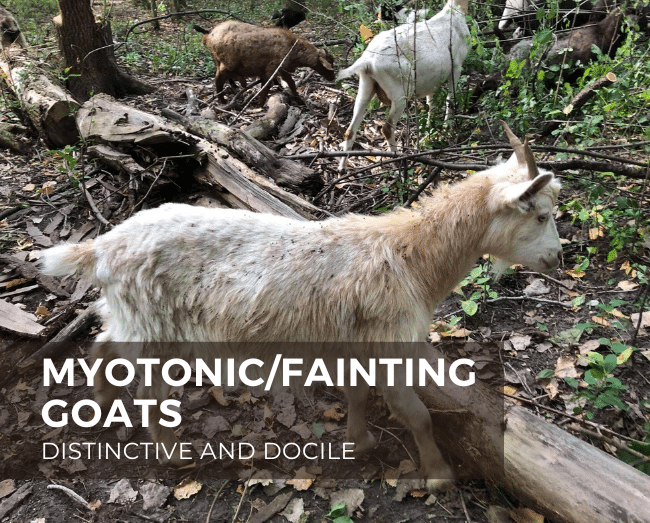The meat goat breed with many names (and nicknames, such as Stiff-leg and Wooden-leg), Myotonic or commonly called Fainting goats are most widely known for their unique and distinctive “fainting” trait they display when startled or scared.
This article will touch on this as well as other common breed characteristics and uses of Myotonic/Fainting goats.
Table of contents
History of the Myotonic/Fainting goat
Unlike many other meat goat breeds, the Myotonic goat breed origins can be traced back to the United States.
The story goes that in 1880 a farmer from Nova Scotia brought over four Myotonic goats to Tennessee and eventually moved on, leaving the goats there to establish the breed from then on.
They’re considered to be quite rare with The Livestock Conservancy estimating a population of under 10,000 Myotonic goats worldwide.

Myotonic/Fainting goat characteristics
Colors and coat
Fainting goats often have black and white coats since it was a preference of early Tennessee breeders but they also come in almost every color combination.
Their coats are similarly varied and can be short and smooth, long and shaggy or something in between.
Size
Myotonic goats are considered to be medium sized on average, though this can vary. Generally they’re stocky and heavily muscled with a tendency for slow growth.
Bucks can weigh anywhere from 130 to 200 pounds.
Horns
Myotonic goats can be both horned or polled. There’s no set standard for their horns which can sometimes be large and appear twisted or small and more straight.
Temperament
Fainting goats are extremely docile in nature and quiet with good mothering traits.
Hardiness
Myotonic goats have good parasite-resistance compared with other meat goat breeds though their myotonia makes them very much NOT predator-resistant. They also thrive in low-maintenance forage management systems and are easy to contain since they’re not good climbers or jumpers.
Stiffness: Why do goats faint?
Why do goats faint? Though it’s commonly referred to as fainting, Myotonic goats get their name from their inherited muscle condition known as myotonia congenita.
Myotonia causes their muscles to “lock up” when they’re startled or scared (related to the fight or flight response), leading them to fall over and lie stiff.
What are fainting goats used for?
Fainting goats (myotonic goats) are a meat goat breed due to their tendency for heavy muscling. However, they are often kept as pets due to their unique fainting traits.
Where to buy Myotonic/Fainting goats
The Myotonic Goat Registry is a great place to start when researching Myotonic goat breeders. You can also consult the Goat Rancher magazine directory which is organized by state.
- Myotonic Goat Registry
- Goat Rancher magazine Myotonic/Fainting goat breeder listings
Fainting Goats FAQS
No, all goats do not faint. Fainting is a characteristic of the Myotonic goat breed, commonly called fainting goats.
Fainting goats are technically the Myotonic goat breed. Additionally, the breed is sometimes called Tennessee fainting goats, Tennessee wooden-leg goats, or stiff-leg goats.
References:
- Myotonic Goat Registry, Myotonic Goat Description
- Oklahoma State University, Myotonic (Wooden Leg) Goats
- The Livestock Conservancy, Myotonic or Tennessee Fainting Goat
Related posts:

LEAVE A COMMENT
Comments